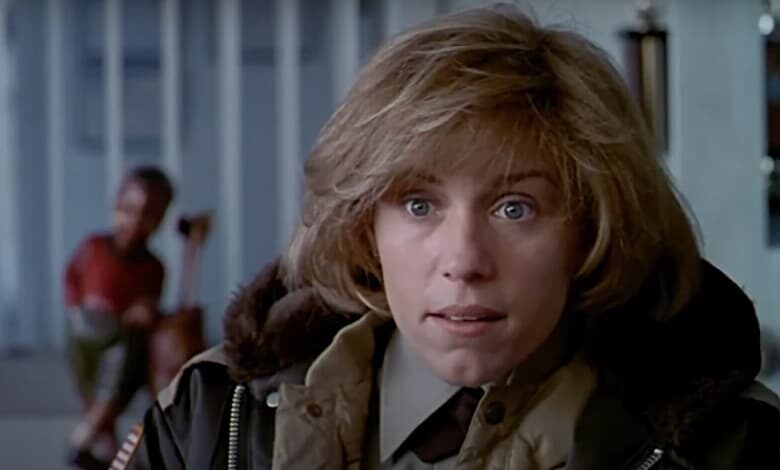
The 1996 film “Fargo” captured something too often missing from American film culture—a portrait of what flyover country actually looks like and how it operates.
It lovingly presents normal people as they encounter (maybe) evil but certainly bad decisions and stupid mistakes. It traffics in the tropes and pitfalls of pursuing the American Dream in what became, 20 years later, recognizably Trump’s America.
Like a William Faulkner short story, the film threads the needle along a border hem between affection and ridicule—and yet stays just this side of rejecting the idea of hope.
Marge Gundersen (Frances McDormand, “Raising Arizona“) and her husband (the rightly named ‘Norm’), represent normal people who want to live normal lives. They don’t understand against whom they find themselves in competition for the “American Dream.”
It’s not that they are stupid—the Gundersens—it’s that the forces they fight are stupid and evil. And so, as they might say in Minnesota, it ends up being a kind of “that’s why things turn out the way they turn out, kind of deal.”
In the film “Fargo” the forces of good win; and it almost looks as if they do so by accident. But, upon closer examination, that is not the case.
Marge’s investigation is straightforward and honest. She wins every competition she finds herself in not only because she refuses to lie, but because the power of evil in the world is impervious to that honesty.
The scene in which she confronts one of the minor players, Shep Proudfoot (Steve Reevis), reveals a kind of moral superiority that the underworld with whom she competes misunderstands and underestimates. In the end, Marge triumphs not from luck but through wit and honest doggedness.
Such is a theme in many of the Coen Brother’s projects. Every film they make is about a choice or a series of choices—and the effects those choices have and the ripples they cause outside their own neighborhoods.
The Coens are, ultimately, interested in relationships between human free will and Divine Providence and Justice. Their vision is perhaps deeply Jewish (as in “A Serious Man”) or Christian and Pagan and Secularist (“No Country for Old Men”).
RELATED: ‘Fargo’ Proves Nice Guys Still Matter
Yet, unlike many of their generational counterparts in film and popular culture, the Coens prove relentlessly optimistic about the human condition. And this explains their dark comic undercurrents—which, in the end, even when their projects lead to tragedy and absurdity, underscore a Purgatorial vision of the human story—it’s comic, not tragic.
For all the bloody violence and accidental comedy in their films and shows, the Coens leave room not merely for affection for the human condition but for miracles—those unexplained “convergences” (as one character calls them In the “Fargo” FX series) that speaks to a larger meaning to everything that resides outside the human experience and understanding.
What makes the “Fargo” FX series so satisfying is the loyalty paid by the writers and directors to the tone and texture of the original film.
In a lesser series, the casting would seem stunted—but in “Fargo,” the casting is pitch perfect and spot on—as are the performances, particularly those of Billy Bob Thornton (Lorne Malvo) and Martin Freeman (Lester Nygaard) in Season 1 and Jean Smart (Floyd Gerhardt) and Ted Danson (Sheriff Hank Larsson) in Season 2.
Even the casting of Key and Peele as non-comic and bumbling FBI agents (late in Season 1) and Gary Valentine (from “The King of Queens”), and Nick Offerman (as the hilariously named attorney Karl Weathers) connect, largely because their performances feels natural.
“Fargo,” from its beginning was about the underside of the compact between man and God in the Old and New Testaments as expressed in the three covenants.
- The promise in the Garden of Eden and how we somehow screwed it up.
- The failure at Babel (the second Fall) when we were punished for failing to ‘go forth and multiply and subdue’ the world, resulting in the Great Flood.
- The Coming of Christ Himself to fix things and die to do it, rise, and resurrect.
The universe operates in a world in which salvation is both only possible and impossible because the arbiters of that universe insist upon being their own gods. Except the ones that don’t.
The ones that don’t, the Coens seem strangely to not merely admire; they like.
There’s something to be said for a universe that recognizes that the evil we see in the world can itself only be evil if and only if Good is not only good, but True. It’s the message the Coen brothers have been sharing the whole time.
Gregory Borse teaches film appreciation, history & development, philosophy, literary theory and a variety of literatures on a small campus in a large university system in the South. His short story “Joyellen” was selected as an online exclusive for West Trade Review’s Summer 2021 issue. He has published or presented in the past on Hitchcock’s “Psycho,” Stephen Frear’s “The Grifters” and seminal horror films ranging from “Nosferatu” to “Halloween,” “The Silence of the Lambs” and “The Strangers,” among others.
